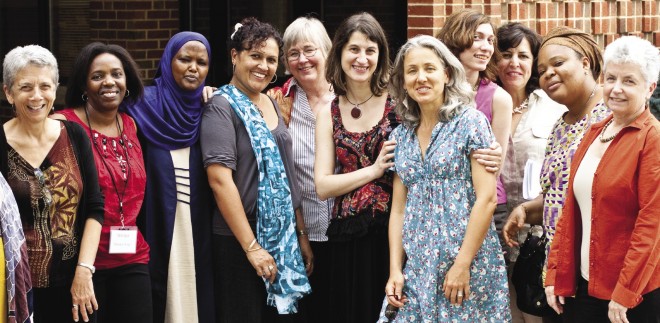
In the first program in North America of its kind, 12 women from Liberia, the South Pacific and Somalia will gather as a carefully selected and wholly sponsored cohort at the 2012 Summer Peacebuilding Institute (SPI), with eight other fully funded women covering the same material at an East African site.
Under the name Women’s Peacebuilding Leadership Program, the 20 selected women will begin a custom-tailored, two-year course of study and training led by the faculty and staff of EMU’s Center for Justice and Peacebuilding.
About half of the study will occur on the EMU campus. The remainder will be strategically planned work under an experienced mentor in the women’s home regions. The women will complete about 30 percent of the requirements for a master’s degree and will receive a graduate certificate at the end of the program, unless they choose to continue their studies beyond its duration.
“The goal is to develop a mutually supportive cohort of women from a particular region of the world—women who have already shown themselves to be social-change leaders or who have real potential to be,” said Janice Jenner, MA ’99, director of the program. The idea is for these women to be resources for each other when they are working for social change in their home regions.
“This program will not be merely academic study divorced from practical application,” Jenner said. “Each subgroup of women will develop a strategic plan for research, analysis and action, and each will have an experienced mentor assigned to them for intensive follow-up.”
Jenner said the idea for training women as social-change agents had arisen repeatedly over the last decade at CJP. Citing a 2009 United Nations Development Fund for Women paper, Jenner said only 2.4 percent of the signatories to 21 major peace agreements were women. In a sampling of 10 delegations negotiating peace, 94 percent of the participants were men. No women have been the head mediator in UN-sponsored peace talks.
A 2005 article titled “The Role of Women in Peacebuilding” by CJP professor Lisa Schirch and former CJP graduate student Manjrika Sewak of India noted: “Traditionally… peacebuilding organizations have looked toward political and civil society leaders (who are usually men) as key people to include in trainings, dialogues, or other efforts to build peace and prevent conflict.”
Women, by contrast, have generally been relegated to addressing specifically “women’s issues,” if they were permitted a voice at all, the authors said.
In their article published by the European Center for Conflict Prevention, Schirch and Sewak called for an expansion in training programs specifically for women to increase their sense of empowerment in and knowledge of peacebuilding processes.
The need for women-oriented programs was a particular interest of Dekha Ibrahim Abdi, a former SPI student and instructor who died in a car accident in Kenya in July 2011, just a month after participating in a symposium at EMU on women in peacebuilding held June 9-11, 2011.
At one point during the symposium Abdi shared the stage with three other women: Koila Costello-Olsson, MA ’05, who directs the Pacific Centre for Peacebuilding in Fiji; Nobel Peace Laureate Leymah Gbowee, MA ’07; and Abigail Disney, producer of peace-themed documentaries. There Abdi threw out this provocative idea: “Are we women innocent victims or are we part of the problem and perpetrators?” She noted that women do raise sons and do support their warring men in various ways. “If we contribute to war, then how do we organize ourselves to contribute to peace?”
The Women’s Peace Leadership Program is a direct result of this June 2010 symposium, attended by 17 women from eight national origins.
Jenner said Abdi’s baton is now being carried in east Africa by Nuria Abdullahi Abdi, MA ’07, a fellow Muslim of Somali ethnic origin living in Kenya, Jebiwot Sumbeiywo, MA ’04, a Christian who works for PACT International in Kenya, and Angela Yoder-Maina, SPI ’07 and ‘09, an American who heads the USAID program funding the Somali women.
Due to difficulty obtaining visas from the U.S. government to study in the United States, some of the Somali women will be studying together in 2012 at a site in East Africa, visited by EMU faculty members.
Four women from Gbowee’s home country of Liberia—with USAID funding secured by the Gbowee Peace Foundation Africa—will be part of this first Women’s Peace Leadership Program cohort. Two women from Fiji and two from the Solomon Islands will be coming in a cohort organized by Costello-Olsson. Funding for this group will come from Church Development Service (Evangelischer Entwicklungsdienst – EED), an association of the Protestant Churches in Germany.
